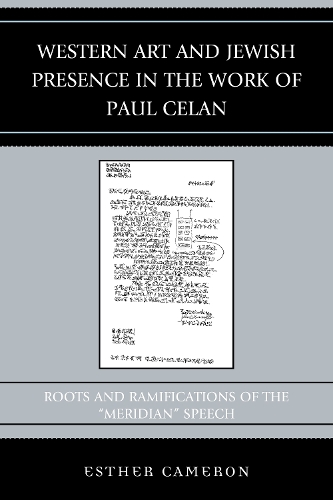
Western Art and Jewish Presence in the Work of Paul Celan: Roots and Ramifications of the "Meridian" Speech
(Hardback)
Publishing Details
Western Art and Jewish Presence in the Work of Paul Celan: Roots and Ramifications of the "Meridian" Speech
By (Author) Esther Cameron
Bloomsbury Publishing PLC
Lexington Books
15th October 2014
United States
Classifications
Tertiary Education
Non Fiction
Literary studies: c 1900 to c 2000
Social groups: religious groups and communities
831.914
Physical Properties
Hardback
324
Width 162mm, Height 235mm, Spine 26mm
594g
Description
Western Art and Jewish Presence in the Work of Paul Celan: Roots and Ramifications of the Meridian Speech addresses a central problem in the work of a poet who holds a unique position in the intellectual history of the twentieth century. On the one hand, he was perhaps the last great figure of the Western poetic tradition, one who took up the dialogue with its classics and who responded to the questions of his day from a global concern, if often cryptically. And on the other hand, Paul Celan was a witness to and interim survivor of the Holocaust. These two identities raise questions that were evidently present for Celan in the very act of poetry. This study takes the form of a commentary on Celans most important statement of his poetics and beliefs, The Meridian, which is an extraordinarily condensed text, packed with allusions and multiple meanings. It reflects his early work and anticipates later developments, so that the discussion of The Meridian becomes a consideration of his oeuvre as a whole. The commentary is an act of listeningan attempt to hear what these words meant to the poet, to see the landscapes from which they come and the reality they are trying to project; and in the light of this, to arrive at a clear picture of the relation between Celans Jewishness and his vocation as a Western writer.
Reviews
Esther Cameron brings a novel and genuine aspect to the exhaustive enumeration of Celan's legacy and Celanian literature: a deeply human and personal one. . . .Cameron's book will be of great guiding value to anyone aspiring to understand Paul Celan's poetry and an insightful literary lesson to anyone reading the giants of German, and to a degree, American literature of the pre- and post-Celan writings. * H-Net: Humanities and Social Science Reviews Online *
[For Cameron], Celans poetry was a path, a way to engage her own existential dilemmas. He was, in short, a poet who changed her life, and this book is her witness. . . .Camerons book is an exhaustive analysis and commentary on [Celans Georg Buchner prize acceptance] speech: each word, each reference, its themes and allusions, what is said and what is not said. She views this speech not only as a key to Celans entire life and oeuvre, but also to the past and future possible relations of contemporary Western and Jewish culture. Her reading of it is passionate, intellectual, religious, poetic, academic, and personal all at once. The exacting, exhaustive word-by-word commentary parallels traditional rabbinic literary modes of interpretation. In an autobiographical note, Cameron writes that her father was a geologist, and there is indeed something geological in her method here as well in the way she lifts and scrapes every fragment, digging slowly and patiently from layer to layer, trying to decipher and put patterns and structures together, probing the crevices. . . .The book is part of her own stated project to create a voice and community responsive to the needs of the contemporary Jewish artistic soul. * B'Or Ha'Torah *
Esther Cameron's book is a comprehensive, sensitive, and insightful commentary on one of the most significant and far-reaching poetic manifestos of the modern era. It will be illuminating to both the novice and the seasoned Celan reader, as well as anyone interested in the place and potential of the Jewish tradition in the modern world. -- Michael Eskin, Cofounder and Publisher, Upper West Side Philosophers, Inc.
Esther Camerons exquisitely written book offers a highly original and compelling meditation on the lyric and thought of one of the greatest poets of our time. -- Amir Eshel, Stanford University
Author Bio
Esther Cameron is an independent scholar, poet, and translatorwho has published numerous articles on Paul Celan and on contemporary poetics.
